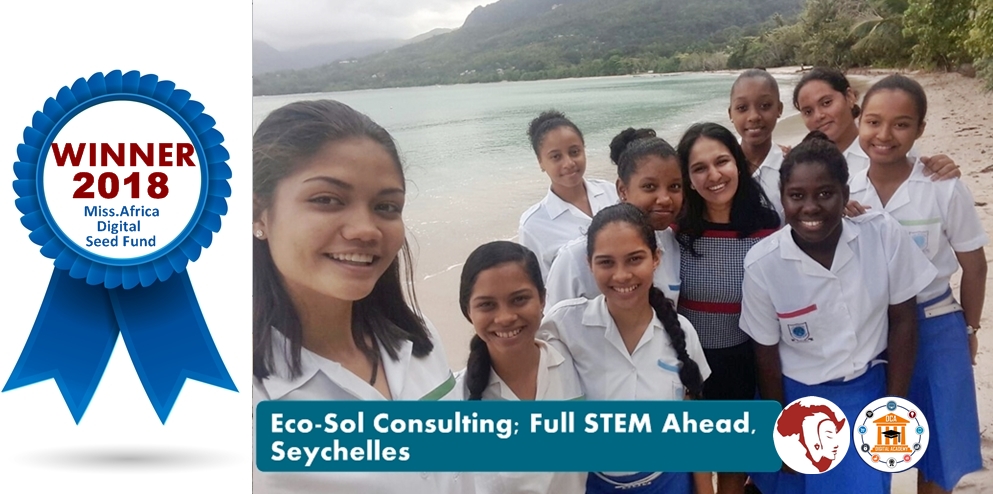‘Full STEM Ahead!’ project by Eco-Sol Consulting (Seychelles) , is a finalist for the 2018 Miss.Africa Seed Fund
Miss.Africa Digital Program spoke Ms. Malshini Senaratne, the Founder Eco-Sol Consulting (Seychelles) which runs the ‘Full STEM Ahead!’ project for girls. She speaks about their program in our interview below
Can you tell us about this project that has applied for the 2018 Miss.Africa Seed Fund Awards?
Francoise Barre, winner of the 2008 Nobel Prize in Physiology and Medicine, noted that ‘certain people [said science] was not a good career for women. That pushed me even more to persevere.’
The ‘Full STEM Ahead!’ project aims to give girls the chance to reach for the futures they deserve by providing opportunities for them to explore concepts around STEM. The project builds on an existing volunteer program I launched, where I run a teaching/mentoring program which incorporates STEM from an environmental conservation perspective for school girls.
The project will target 30 secondary school girls aged between 12-14 years with the inclusion of 5 boys as Ally Ambassadors. This program can be stretched to meet the needs of the school environment as well as for holiday camps which makes it very sustainable and adaptable to any country context.
Given there are no STEM programs in Seychelles for girls, the program plans to generate an early interest in STEM through insightful and interactive activities. Various elements shall be covered including introduction to STEM careers, hands on activities, interactions with female STEM professionals and students, site visits, inspirational movie viewings and the use of innovative technology.
The objective of this program is not just to run a project around STEM but to also tackle the cultural challenges and myths girls may encounter around taking STEM career paths. The program aims to address cultural and gender challenges by including boys as Ally Ambassadors and conducting cultural games and activities designed to shine a light on the gender gap in STEM fields. The program will also take a collaborative approach, including using teachers and volunteers who will be trained to duplicate the program for other schools across Seychelles through public private partnerships in future.
What are some of the challenges you are trying to address with your project?
Globally, UNESCO notes women make up less than 30% of the people working in STEM careers and the situation is worse in sub-Saharan African countries and no less different for the Seychelles, the smallest nation to form part of Africa.
Nichelle Nichols, a former NASA Ambassador, remarked that ‘science is not a boy’s game, it’s not a girl’s game. It’s everyone’s game. It’s about where we are and where we’re going.’
This project aims to tackle the pervasive idea that only boys excel in math and science-based subjects. International research shows that most girls do not get to see or interact with adult women role models in STEM-related careers. The lack of awareness, encouragement and availability of good role models may lead to girls fearing STEM subjects and avoiding them at an advanced level, ultimately limiting their career aspirations.
By providing students with the platform, space and security to tackle, learn and develop an interest in STEM, the project plans to demonstrate that girls can be just as good at math and science. Through the provision of female speakers in STEM fields, site visits and inspirational screenings where participants get to interact with female role models working in STEM fields, the project will provide participants with mentoring avenues and open their eyes to the possibilities within STEM fields.
Lastly, the project intends to promote the streamlining of both genders in STEM, through the inclusion of boys as Ally Ambassadors. By raising their awareness of the benefits in having girls take part in such fields that continue to be male-dominated, the project plans to shine a light on cultural challenges around STEM and ways to mitigate them.
How are you bringing innovative approaches to these problems?
This project recognizes that it is not enough simply to raise girls’ interest and awareness in STEM fields. The cultural challenges they face around entering STEM fields must also be addressed. The most innovative approach this project brings to the forefront is the inclusion of boys as Ally Ambassadors in the program, to raise their awareness of the benefits of including and working with girls in STEM.
The project plans to bring technologically innovative learning approaches to the classroom for the first time in Seychelles, by using Plickers software; an assessment tool that allows facilitators to collect on-the-spot formative data without the need to have students use devices or paper and pencil.
Mae Jemison, the first African American woman astronaut in space encouraged girls by telling them not to ‘let anyone rob you of your imagination, your creativity, or your curiosity. It’s your place in the world; it’s your life. Go on and do all you can with it and make it the life you want to live.” Through female guest speakers and site visits to STEM-based organizations, the project plans to connect students to potential mentors, inspire them to make the life they want to live, and open their eyes to the career possibilities in STEM.
How does it feel to gain international recognition for your work?
I am extremely humbled and pleased by the attention this project has received from the Miss Africa Seed Fund.
During the 2017 Mandela Washington Fellowship Summit in Washington D.C, I represented Jersey-based Rutgers University on the panel of Ignite Speakers, where I spoke on the importance of girls’ STEM education in Africa. I urged the audience to ‘step up to the front lines and help re-write our girls’ stories. Get your company involved in a girls’ education project. This is how we will move Africa forward, this is how we will rise.’
I was also selected to undergo a practicum with the Centre for Advancement of Science and Mathematics (CASME) in South Africa this year, where I visited rural schools, met university and school teachers and participated in STEM-based activities to develop a STEM program for the Seychelles. I take this opportunity to extend my gratitude to the Mandela Washington Fellowship and the Miss.Africa team for allowing me the chance to push this dream forward.
The recognition gained serves to shine a brighter light on the issues preventing our girls from entering STEM fields. This is vital, because in the words of Desmond Tutu, ‘if we succeed in empowering our girls, we will succeed in everything else.’
Can you explain why skills for women in tech is so important?
Monoculture is simply bad for business in this day and age. The same concept applies to the tech industry, where men continue to outnumber women. Research, however, shows that companies that have more skilled women than men perform better. The proof? Fortune 500 companies which hold at least 3 female directors have seen their return on invested capital increase by at least 66% and their return on sales rise by a staggering 42%.
Regina Agyare, the founder of Ghana-based Soronko Solutions, noted ‘by learning to create technology, girls learn to speak up.’ In the digital age, tech has come to imbue every aspect of our lives and female entrepreneurship rates in Sub-Saharan Africa are the highest in the world! Having skilled women in tech empowers them to develop entrepreneurial solutions to unique problems, but also to develop their voice and impact not only the bottom line, but society as well.
In this light, the proposed STEM project is important to develop and grow girls’ skills in tech to spur innovative new ideas and business opportunities. As the need for skilled women in tech becomes more and more apparent, it is imperative to convince the upcoming generation that STEM isn’t just for boys.
What in your opinion should be done to address the digital skills gap in Africa?
Christie George remarked that ‘in a society that systematically excludes and marginalizes, bringing new voices to the table requires a deep commitment to relationship building. It takes work. It takes time. It takes trust. And it is totally worth it, resulting in better decision making, better products and better performance.’
When I successfully secured a US$10,000 grant from the U.S Embassy to hold a leadership conference in Seychelles for aspiring young leaders from STEM and non-STEM fields, I spoke on the need to achieve gender equality as it is crucial to creating inclusive, open and prosperous societies. Similarly, women in top leadership positions, a highly outnumbered class, should respond to the challenge by becoming highly organized, creating women’s networks, fostering relationships and working together to transform not only the industry, but society.
From personal experience, I also believe we should start by investing in the future now. Eco-Sol Consulting is currently the only private company in Seychelles running a teaching/mentoring program on school grounds. The private sector can therefore stand to do a lot to guarantee the future viability of their own companies by choosing to take an interest in the education and schooling system they operate it. By sponsoring scholarships, internships, running STE-based courses, providing holiday jobs, mentoring programs or starting Fellowships to gather young people who want to develop digital skills, private sector companies and individuals can make an impact early and eventually see the returns in future. It’s everyone’s game!
Click here to watch on DotAfrica.Tv

Ms. Malshini Senaratne, Full STEM Ahead!’ project, Seychelles
Ms. Senaratne, is the Founder Eco-Sol Consulting which runs the ‘Full STEM Ahead!’ project for girls.
The ‘Full STEM Ahead!’ project aims to give girls the chance to reach for the futures they deserve by providing opportunities for them to explore concepts around STEM. The project builds on an existing volunteer program I launched, where I run a teaching/mentoring program which incorporates STEM from an environmental conservation perspective for school girls.
